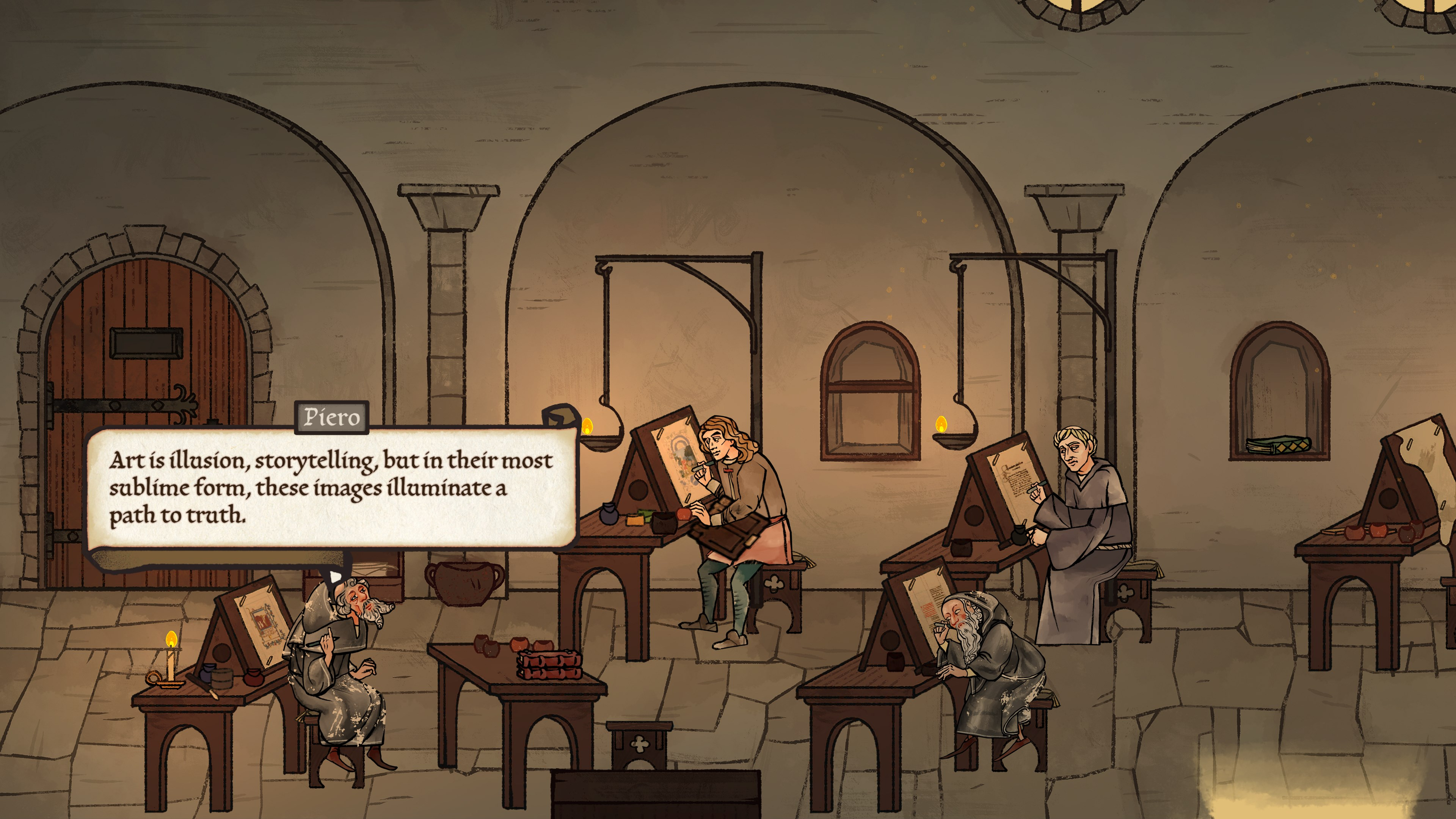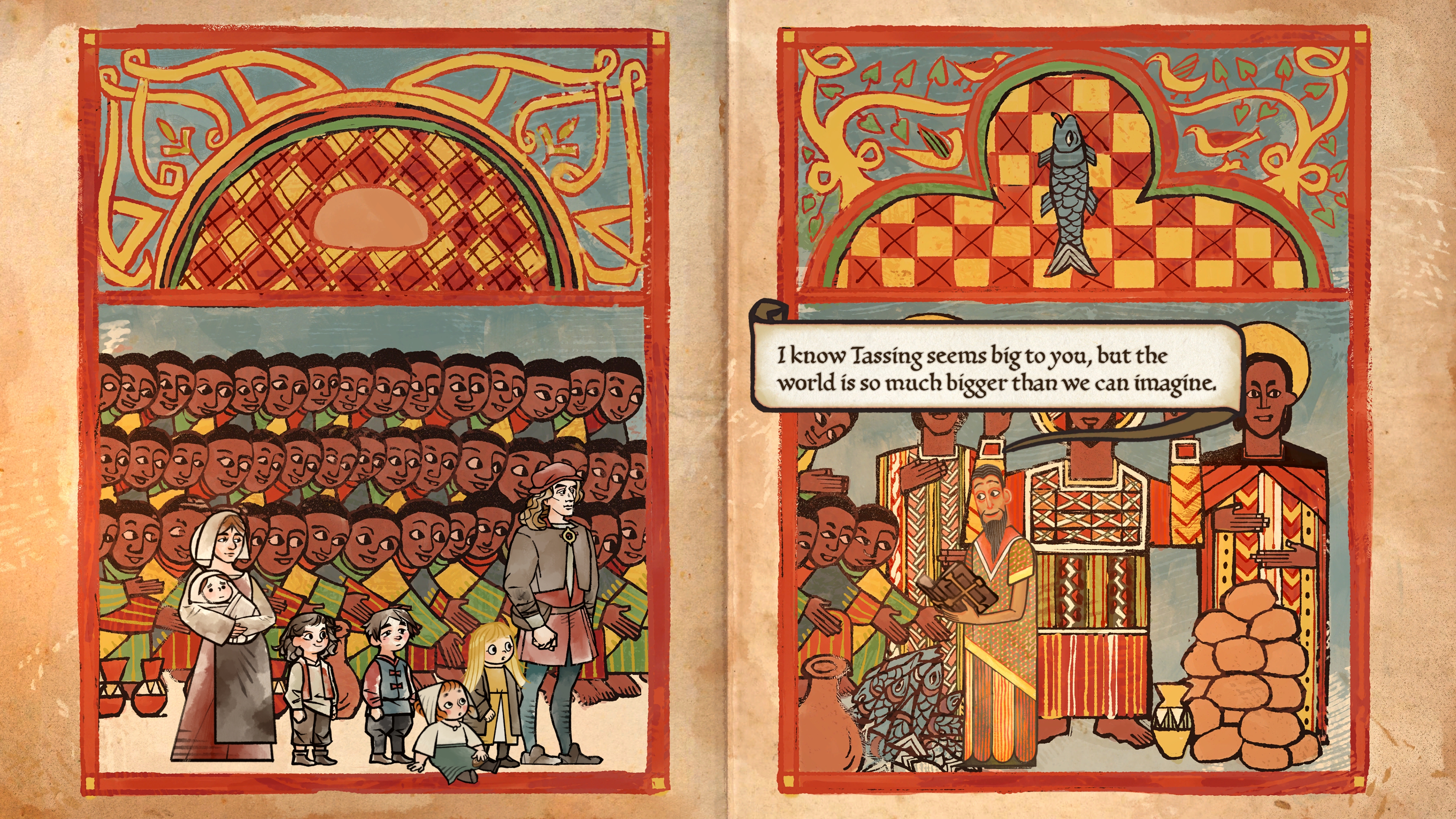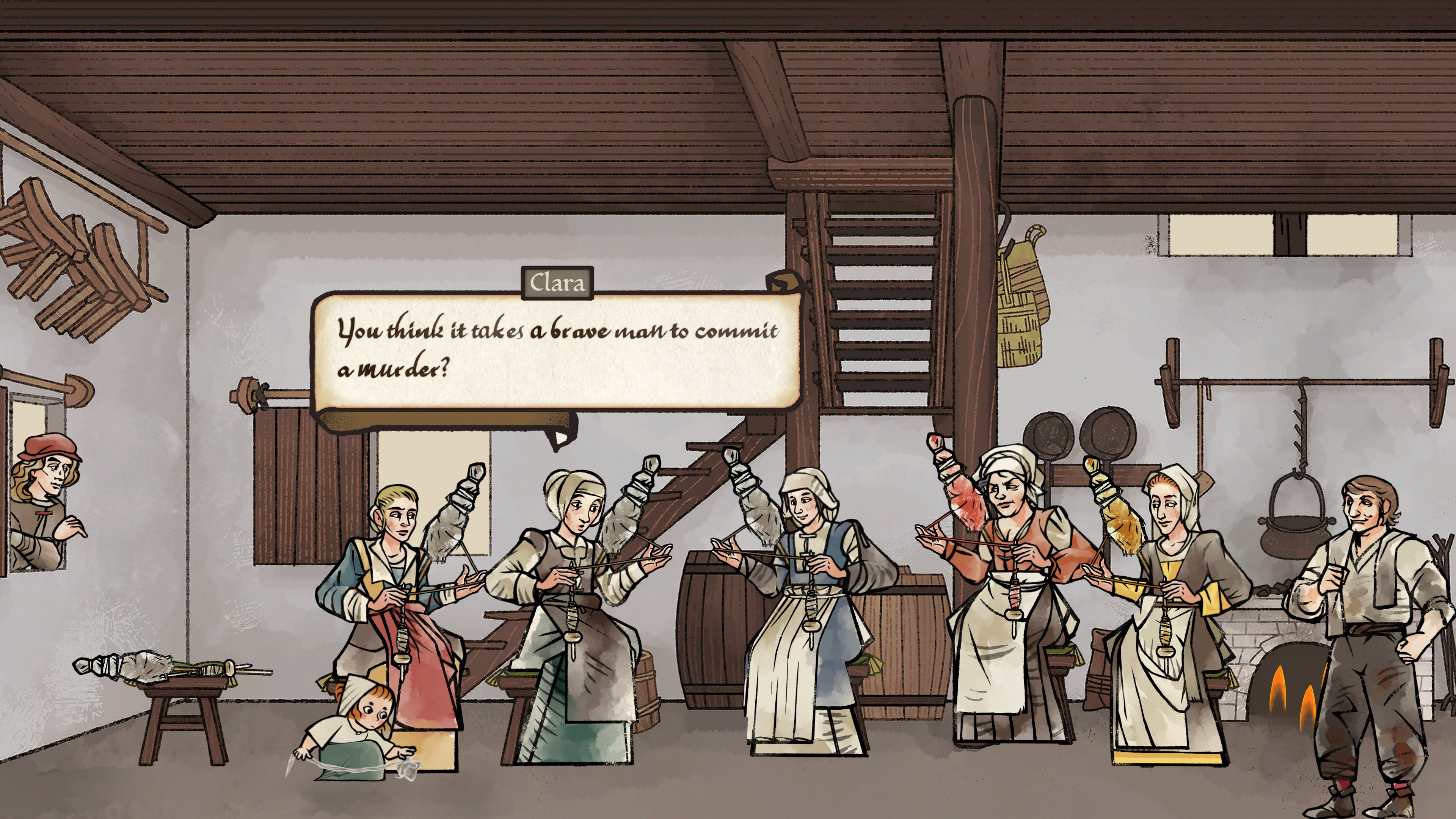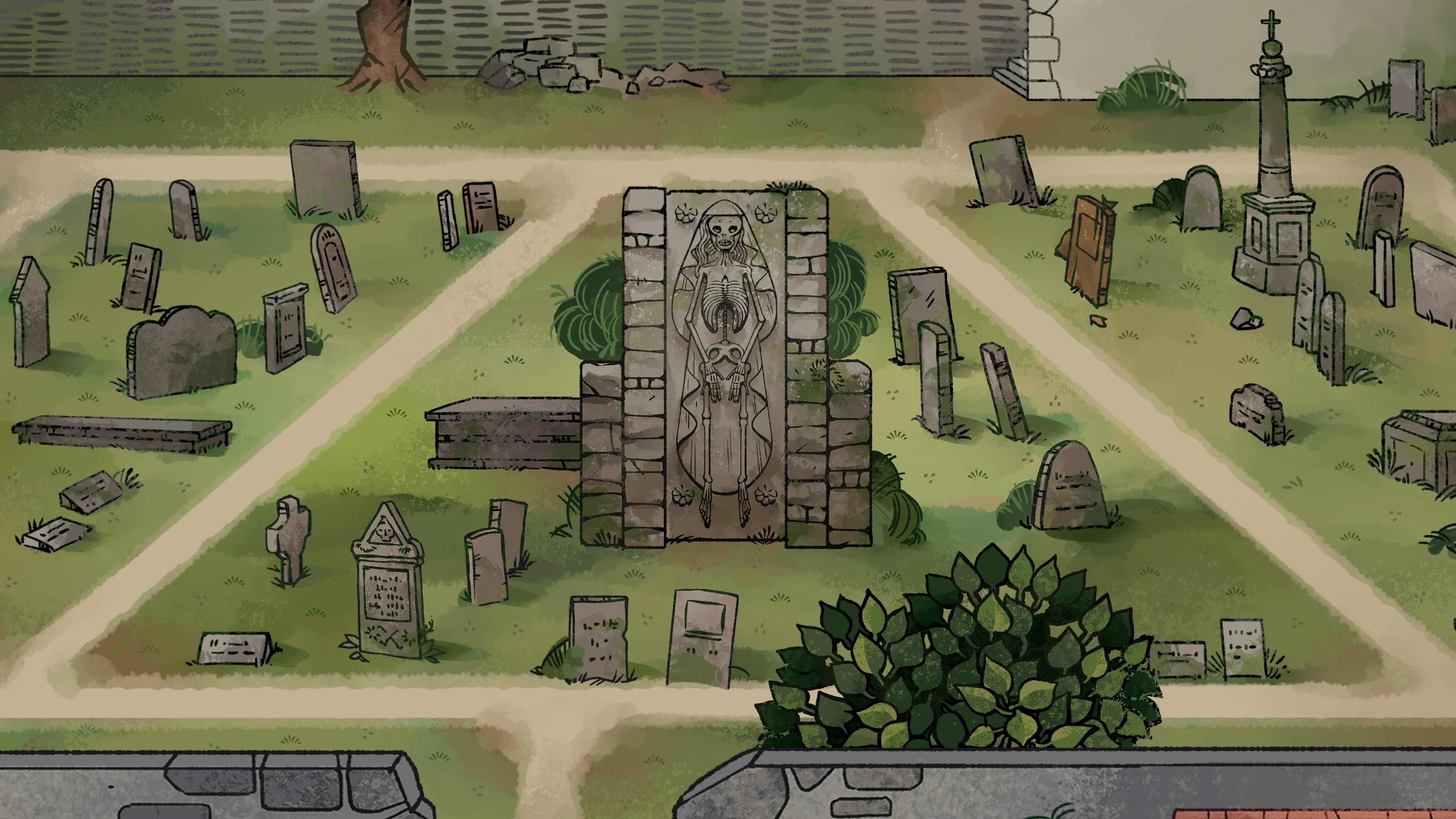History is a fickle creature, as objective fact is too-often buried and obscured by layers upon layers of subjective interpretation, cultural retellings, biased alterations, and, often, literal dirt and stone. The latest video game from Obsidian Entertainment, masterminded by the legendary Josh Sawyer at the helm of a small team of just 13 developers and support teams, is a story all about the ever-changing nature of the past — and the human beings that drive that change.
Pentiment brings players back to a distant past — the 16th century in the Bavaria region of Germany — not as detached from our modern world as you may think. A decades-long conspiracy, shown through the uncertain eyes of journeyman artist Andreas Maler, grips the small town of Tassing, hidden in the peaks and valleys of the Alps. It’s up to players to shape the kind of person they want Andreas to be, unravel the mystery at the heart of a terrible murder, and guide the past, present, and future of a town filled with incomprehensibly complex, yet simultaneously simple, people.
The result is one of the most fascinating and addictive games of 2022, but one that is almost certain to divide potential players.
Disclaimer: This review was made possible by a review code provided by Xbox Game Studios. The company did not see the contents of the review before publishing.
Pentiment review: What’s good

Providing a condensed synopsis of Pentiment and the elements that make it so amazing proved to be an extremely difficult task after the credits rolled. The deceptively simple premise of this historical narrative adventure is met with a story that boldly discusses politics, religion, philosophy, racism, gender, cultural movements and shifts, and much more — all through the eyes and experiences of humans just trying to live their best lives.
Many themes are explored in Pentiment, but none of them are the theme of the game; They’re all simply the result of existence, and Pentiment is unafraid to depict what it means to exist — especially in the world of 16th century Bavaria. The result is a single-player campaign that enraptures your attention and holds you captive for the entire 15 to 20-hour journey. During this time, you’ll meet a variety of unique characters, learn more about the lightly fictionalized historically accurate world (read: many of the individual characters are made up, but the surrounding locations, events, and references are based in real-world truth), and attempt to discover the perpetrator behind the murder of a local Baron.
| Developer | Obsidian Entertainment |
| Publisher | Xbox Game Studios |
| Genre | RPG, historical narrative-adventure |
| Install size | 10.7 GB |
| Players | Single-player |
| Playtime | ~20 hours |
| Release date | Nov. 15, 2022 |
| Retail price | $20 |
| Platforms | Xbox Series X|S, Xbox One, PC (Microsoft Store, Steam) |
| Xbox / PC Game Pass | Xbox, PC, Xbox Cloud Gaming |
| Reviewed on | Xbox Series X |
The manner in which Pentiment’s story is delivered to players is a huge part of its undeniable charm. The entire game is rendered as if pulled from an illuminated manuscript illustrated by the talented artists and scribes of the period. There’s even an overview mode that shows the current scene in an illuminated manuscript, surrounded by relevant illustrations and drawings, as well as helpful pictures and definitions for important words underlined in the dialogue.
That aforementioned dialogue in Pentiment is oozing with personality, and immediately drew me in; Obsidian Entertainment managed to make Pentiment’s text-heavy narration a strength rather than a weakness. Every character in Pentiment has a unique font that mirrors Andreas’ personal perspective of that character; Scribes and monks write with a flowery script, peasants scrawl with a messy hand, printers press their type into the page rather than write, and more. What’s more, that font can change mid-conversation if Andreas learns something that shifts his perspective. For example, Andreas may realize that who he believed was an illiterate peasant is actually educated. Suddenly, that character’s casual font becomes more formal and complex.
Pentiment ensures that even the act of reading has value in the story.
This all works because the dialogue in Pentiment is written onto the page in real-time, complete with typos that are hurriedly fixed by the writer with the sound of a knife or rock scraping the ink from the paper. The ink blooms and dries over a brief period of time as it sets, and it doesn’t always do so in a consistent fashion. Finally, important words that are written in a distinct colored ink (such as holy words, written in red) are placed on the page after the rest, in line with the process of actual scribes from the era. It may seem deceptively simple on the surface, but this approach to written dialogue comes with an attention to detail not seen in many other games. Most of your time in Pentiment may be spent reading, but Obsidian Entertainment has put in the work to ensure that even the act of reading has value for how you interpret the story.

When it comes to the story itself, Pentiment is relatively straightforward. There are three Acts, spread across a 25-year period, all of which set in the Bavarian town of Tassing and the nearby Kiersau Abbey. While it may seem preposterous at first glance to squeeze 20 hours of gameplay out of what appears to be a simple murder mystery and a single location, Pentiment never overstays its welcome or feels too drawn out.
Throughout the entire ordeal, you feel intrinsically involved in everything happening in Tassing. You control who Andreas Maler is, what he knows, and from where he came. Your decisions directly and indirectly affect the future of Tassing and the local abbey, with branching narrative paths that may not be clear until hours after the decision that led down it. You become familiar with the layout of the town, the people who live there and their roles within it, and how you all fit into it.
Pentiment’s narrative has branching paths not made clear until hours after the decision that made them.
A journal, always on Maler’s person, keeps track of various notes such as his current itinerary and objectives, maps of the area, and a running guide on all the people he’s met. There’s even a glossary with short descriptions of people, locations, and words relevant to the story and the time during which it takes place. At first, this can all feel a little overwhelming, but it doesn’t take long to become comfortable exploring in Tassing and talking with its inhabitants.
I won’t go into more detail than I already have on Pentiment’s story; The less you know, the better. Suffice to say, there’s a lot more going on than you may realize. More than that, your playthrough of Pentiment will likely look vastly different than mine, as your decisions take you down a different path. In this way, Pentiment feels very replayable, even if the overarching plot will lose its air of mystery after the first playthrough.

The gameplay in Pentiment isn’t action-packed or filled with high-intensity scenes reliant on fast reaction times. Pentiment tests your mind more than your hands, with the majority of the game being spent reading or walking around. There is an assortment of various mini-games throughout to add some variety, but Pentiment’s gameplay certainly isn’t its primary draw.
Simple gameplay means a smaller accessibility menu, but Pentiment still delivers on features and settings to help players of all abilities and skill levels play. Fonts can be simplified for better readability, font size can be adjusted, a high contrast mode can be enabled for superior visibility, and a text-to-speech narrator can be enabled for those who would prefer to hear rather than see. There are individual control bindings across keyboard and controller, giving players plenty of customization over their experience. Pentiment is also localized for seven different languages, including English, French, German, Italian, Polish, Portuguese, and Spanish.
Finally, Pentiment’s meritoriously detailed world isn’t just filled with humans and their ilk; throughout your adventures in Tassing, you’ll encounter a variety of furry animals eager to be pet. Being an obvious highlight of my playthrough, I commemorated every fur baby I met in the images below (minus those in Act 3, to avoid spoilers).
Pentiment review: What’s not good

It’s very difficult to find anything negative to say about Pentiment. Regardless of how players may feel about its simplistic gameplay, text-reliant narrative, and insistence on historical accuracy, Pentiment excels at everything it set out to do. Josh Sawyer and Obsidian Entertainment made the game they intended to make, and as such it’s hard to criticize it; It’s nearly perfect, from beginning to end.
Aside from minor technical issues, Pentiment feels nearly perfect.
I say “nearly,” of course, because nothing is entirely perfect. I did notice a small handful of visual bugs in Pentiment, such as my character clipping through the railing of a staircase, or another character appearing below and behind a fence during a conversation. Aside from the purposeful typos that are fixed as part of Pentiment’s dialogue delivery, I observed a few actual typos, grammatical errors, and missing words. Finally, I experienced some difficulty navigating to different areas of the map in certain places, where there are multiple paths in close proximity.
Aside from those negligible technical flaws, one may be able to gently criticize Pentiment for some narrative tropes in the final act or an ending that felt just a few minutes shorter than it could’ve been, or question why there isn’t even more depth to the vast roster of characters than it already is. For me, though, none of this holds much water — Pentiment is polished, brilliantly written, and absolutely a finished product that accomplishes exactly what its designed to accomplish.
Pentiment review: Should you play?

Pentiment is messy. The pieces don’t always fit together, not every loose thread is plucked, and every interaction doesn’t necessarily advance the story or bring you closer to the “finish.” In Pentiment, that’s the point. Beyond the decades-long murder conspiracy looming over the early German town of Tassing, the religious undertones that underline every single word and action in bright red ink, and the persistent theme of grief, loss, and how it affects people… Pentiment is about being human. People are unknowably complicated; it’s the knowledge of where we come from, the experiences of what we’ve been through, and the influences of the people around us that shape us into who we are.
Pentiment recognizes that good people are still capable of making bad decisions, that the people who seek power will often abuse it, and that nothing in life is ever black and white. There’s no “right” path in Pentiment, only the journey you will take. There’s no one “true” history for the people of Tassing, only the version that will survive to be passed down to future generations. Most importantly, there’s no “happy” ending, only the one you make as a consequence of your decisions.
Pentiment is one of the best games of 2022.
As a video game, Pentiment may be lacking for many potential players. There’s no action or combat here, and the majority of your time in Pentiment is spent reading. As an interactive story, though, one based in a lightly fictionalized version of a world long gone — a past that can still be seen today through its influences — Pentiment is absolutely incredible. It explores the effects of time on truth, hardship on people, religion on morality, and chance on desire. The decisions you make appear simple, and the story that unfolds due to those decisions is more about humanity than drama, but Pentiment still manages to unequivocally capture your attention with the genuine way it expresses those aforementioned themes, and the characters it uses as a vessel to deliver them.
This is the second time in 2022 that Obsidian Entertainment has delivered an excellent, supremely creative game developed by a smaller team, starting with Grounded earlier this year. Pentiment isn’t a “AAA” game, and it’s certainly not going to dominate the video games industry or top the sales charts for the holidays. It is a remarkable achievement and one of my favorite games of the year, however, and I strongly urge any Xbox or PC player to give Pentiment a chance.

Pentiment is available in every tier of Xbox Game Pass Ultimate, including on Xbox and PC, and through Xbox Cloud Gaming. As a first-party Xbox Game Studios title, it’s destined to stay there forever, making Microsoft’s gaming subscription the best way to experience this incredible narrative masterpiece.





